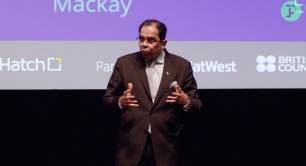Let’s stop fetishising social investment
One of the highlights of the Good Deals and Beyond Good Business conference, run by Pioneers Post and Hatch and held in March 2018, was the opening plenary session. This was an esteemed panel including Baroness Glenys Thornton of the House of Lords, Amit Bhatia, CEO of the Global Steering Group for Impact Investment, Dr. Mairi Mackay at the British Council, Toby Eccles of Social Finance, and Indy Johar, co-founder of Dark Matter Laboratories.
As with any good debate, there were wide-ranging points of view. The discussion tripped nimbly from wild optimism in the power of social enterprise, to gloominess about stark social realities of our times. The melody running throughout was a commitment to social change. This speaks to the heart of why many of us are involved in social enterprise and social finance.
The discussion tripped nimbly from wild optimism in the power of social enterprise, to gloominess about stark social realities of our times
Amit Bhatia made the positive case that impact investment aligned to social enterprise is a global and unstoppable movement. Mairi Mackay advanced the British Council perspective that supporting the development of creative and social enterprises will promote sustainable and inclusive development in the UK and emerging economies. Baronness Glenys Thornton, from the House of Lords, sought to reinvigorate political interest in social enterprise, while a current vacuum exists across all parties in understanding and support for social enterprise. Indy Johar brought the strategic perspective of system change, arguing beyond the incremental approaches of social enterprise and social investment, for the importance of social movements to drive social innovation.
What was powerful in this conversation was its far-reaching perspective. Rather than mired in the detail of social investment, this plenary session danced across government, finance, economic and social factors that contribute to social change. This cross-cutting approach is certainly a more effective way to grapple with the challenges the social sector faces.
Too often in our sector, finance is a means confused with the ends. Social investment has been fetishised as either the sole solution or the sole problem. Perhaps this is the legacy of a political policy to champion social investment as part of a utopian “Big Society”. The social investment sector was given a political heart, in the form of Big Society Capital and various publicly-funded initiatives to drive investment readiness. Finance could thus be re-positioned as a force for good, to drive capital to the social economy. The reality of social investment is more complex.
Several discussions at the Good Deals and Beyond Good Business conference pointed to the failures of social investment – a debate that continues. Social investment has come a very long way since Sir Ronal Cohen’s first Social Investment Task Force in 2000. It is still a work in progress. It’s important to point out what is wrong with social investment to drive innovation and adaptation.
Social investment is one tool, it is not the machine
Let’s not pin too many hopes on social investment to solve the lack of funds for the social sector. Social investment is one tool, it is not the machine. Not every social organisation is suited to social investment. There is a very real need for grant and public funding to bolster social organisations. The question remains: who pays? The real stars of the social economy are those entrepreneurs who work tirelessly to keep a social enterprise going, to improve the lives of vulnerable, disaffected or unwell people in our communities.
Listen to the full plenary session here.


